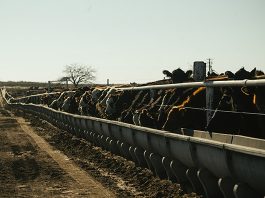A few years back, a publisher specializing in agriculture books contacted me about distributing my book, “Cows Eat Weeds.” In spite of myself I was flattered, because if a publisher wants your book that seems like a good thing, right?
Well, maybe not. This is how things work for most of us in the publishing world:
 When I started writing my book, I decided to learn more about the ins and outs. What I found is that it is typical for an author to sign a contract that gives her 6 to 10% of each book sale. The rest goes to the publisher to cover printing, shipping and marketing. Marketing is different than promoting. It’s all about the little ads you see, or the publisher’s website, or the cost of mailing a book to someone who might review it. Promoting is the author’s job. That means making public appearances, like book tours and presentations at conferences. While on tour, you can buy your own books at a reduced rate to sell to the people you meet. But of course you don’t get the 6 to 10% on top of that.
When I started writing my book, I decided to learn more about the ins and outs. What I found is that it is typical for an author to sign a contract that gives her 6 to 10% of each book sale. The rest goes to the publisher to cover printing, shipping and marketing. Marketing is different than promoting. It’s all about the little ads you see, or the publisher’s website, or the cost of mailing a book to someone who might review it. Promoting is the author’s job. That means making public appearances, like book tours and presentations at conferences. While on tour, you can buy your own books at a reduced rate to sell to the people you meet. But of course you don’t get the 6 to 10% on top of that.
It was that information that turned me into a self-publisher. But I didn’t go the typical self-publisher route. Instead I found a printer whose specialty is books and I did all the layout so that they could print my book for me. Working with them I got 500, full-color, 150 page books printed and shipped to me for about $5 each.
In the instance above, the publisher wanted to distribute the most recent printing of my book. They’d pay me the $5 it cost to print it plus my 10%. I was confused because I couldn’t see how this was a good deal for me. When I did the math it looked this this: I sell my book to the publisher for $5. They sell it to the reader for $35. I recover my cost of $5 which I have to save for future reprints, and then I make $3.50 for every book I sell. The publisher makes $26.50. If I keep selling my book myself I make $30.00 per book or just $25 if I put aside money so that when it’s time to reprint I can do that.
When I told the publisher what the math looked like to me he said that I would actually make more money working with them because there would be higher volume. “Maybe,” I said. “But I’d have to sell 10 times as many books, and that just doesn’t seem reasonable to me given that not everyone wants to teach their cows to eat weeds.” I politely declined the offer.
I was flattered once more when this same publisher called asking if I would be interested in writing a book for them on grazing management. There were two things that made me say no. First, yeah, I could write a book about grazing management, but I think there are other people who could do it better. I would worry that the reader wasn’t getting his or her money’s worth from me. The second reason was the economics.
 This time they offered me an advance. Until they told me how an advance works, I thought it was money they were paying me to write the book and then on top of that I would get my 6-10% of every book sale. Turns out an advance is just up front money based on the publisher’s estimate of how many books you might sell in the first 6 months or so. So basically the first 300 books selling at $30 each covers my advance. If they sell more than 300, then I’ll start getting additional checks.
This time they offered me an advance. Until they told me how an advance works, I thought it was money they were paying me to write the book and then on top of that I would get my 6-10% of every book sale. Turns out an advance is just up front money based on the publisher’s estimate of how many books you might sell in the first 6 months or so. So basically the first 300 books selling at $30 each covers my advance. If they sell more than 300, then I’ll start getting additional checks.
I figured out how much time it would take me to write the book, and then how many books they thought I would sell and realized that my hourly rate wasn’t great. I talked to the publisher and said, “Wow! I would only make $2.50 an hour if I make this agreement with you.” He laughed and said, “Yeah, we tell our authors not to quit their day jobs.” Some authors are ok with this. But for me, it seemed strange that he found nothing odd about his day job being reliant on me working two jobs, one of which was supporting him by writing a book. I told him “This is my day job. So I’ll have to say no.”
I have nothing against working with publishers if they’re really adding value to the product. All authors need editors, someone who will not only spot grammar problems and misspellings, but who will also tighten the story by taking out repetition and rambling. For non-fiction, we also need Fact Checkers, and someone to create an index so readers can make good use of our books. All of that is important for a good product, and for the reputation of both the publisher and the author.
When I wrote my book and acted as my own publisher, I had to do those things myself. I had the first draft read and edited by 8 different people and I incorporated their input into the final product. Then I hired a real live indexer so that readers had a tool they could use to find things quickly. I also set up my website, and went about promoting my book at speaking engagements. That’s not something everyone is willing to do or that everyone can do.
 The publishing system exists as it is today because it has worked well for everyone. Publishers had access to markets and readers that an author couldn’t reach. Today things are changing. It can still be hard to get your book in front of readers so they will buy it. But with the internet, Facebook, Amazon, agriculture conferences and workshops, and websites like On Pasture, authors have ways of reaching readers that they never had before. Heck you don’t even have to put the book in print since more and more readers are using tablets and smart phones to read books.
The publishing system exists as it is today because it has worked well for everyone. Publishers had access to markets and readers that an author couldn’t reach. Today things are changing. It can still be hard to get your book in front of readers so they will buy it. But with the internet, Facebook, Amazon, agriculture conferences and workshops, and websites like On Pasture, authors have ways of reaching readers that they never had before. Heck you don’t even have to put the book in print since more and more readers are using tablets and smart phones to read books.
For some of you, the old publishing route will be best. But at least be aware of and think about different options before you sign on the dotted line.
And if you want to know who printed my book, drop me an email and I’ll send you the information. Or if you’re just interested in other options and ideas, I’d be happy to correspond with you about my thoughts.





Well explained, Kathy.
Thanks for affirming my understanding of the problems of working with publishers. It is not just the ag book world where this is true, and the publishing industry is in a similar bind to that of print journalism. In this age of constant internet blahblah, quality writing is being undervalued and good writers end up needing day jobs (or a partner who can support their habit).
The promotion piece can be a big time suck too, and if a publisher is able to set up book events and do publicity, as well as getting the book in front of reviewers, it is a huge plus for someone who is not able to offer practical workshops. I’ve hired an editor, indexer, and book designer/social media maven, and am working on my own promotion – besides all the stuff involved in making a living. It’s exhausting!
If you’re interested, check out http://www.organic-revolutionary.com.
P.S. I sometimes use your columns for my on-line class for Green Mt. College, Theory &Practice of Sustainable Agriculture. Great stuff!
Comments are closed.